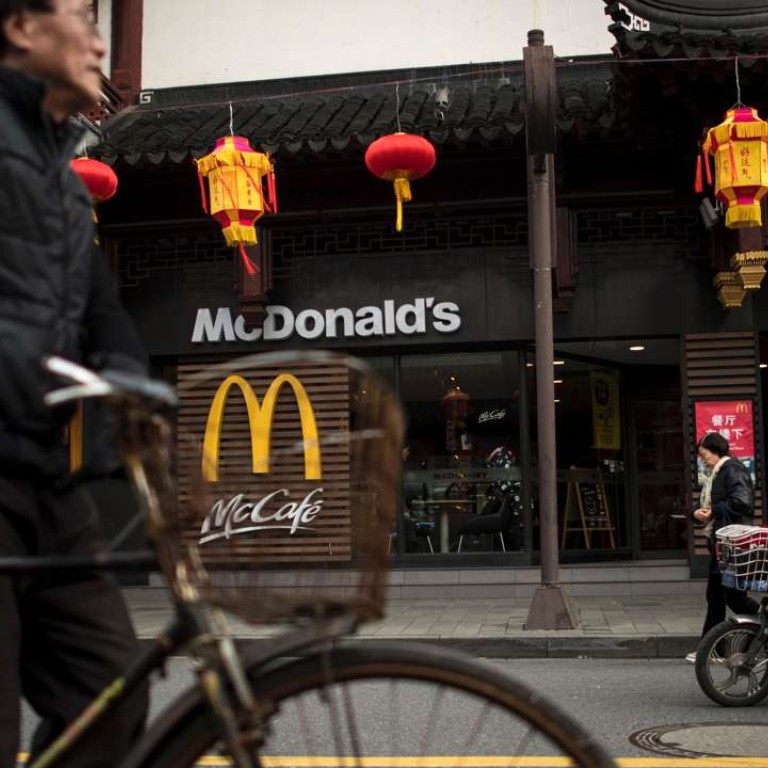
Citic rings in better-than-expected 2016 net profit, looks to close McDonald’s deal by July
State-backed conglomerate planning more spin-offs and listing of other group assets, says chairman
“We are waiting for the necessary approvals, and expect the same to come sometime between June and July,” chairman Chang Zhenming said during the company’s annual results briefing in Hong Kong.
Two anti-monopoly complaints have been filed by a Chinese consultancy to the ministry of commerce against the McDonald’s deal, Reuters reported last month.
“We are not familiar with the details of the complaints. The ministry is dealing with it,” Chang said.
In January, Citic, Citic Capital, and US private equity firm Carlyle Group jointly announced the purchase of an 80 per cent stake in McDonald’s mainland and Hong Kong businesses for US$2.08 billion.
“There is still huge growth potential for McDonald’s, particularly in [China’s] tier 3 and 4 cities,” Chang said that Citic would not depute top executives to manage the McDonald’s business.
The acquisition has low execution risks as the restaurants will be operated under a franchise system managed by McDonald’s, analysts at Deutsche Bank wrote in a report.
It should benefit Citic with stable cash inflows in the future as the McDonald’s management aims to add another 1,500 restaurants in the mainland and Hong Kong, the bank said.
“Citic already has a broad participation in the consumer sector and it will only expand after the McDonald’s deal,” Chang said.
The Chinese conglomerate said that its unit Citic Press would shift from the National Equities Exchange And Quotations, or the so-called the “New Third Board” to the main board in the A share market. In addition, it would also consider more spin-offs and listing of other group assets, without any specific timetable, Chang said.
Earlier the company said net profit for 2016 rose 3 per cent on year to HK$43.1 billion (US$5.54 billion), aided by the HK$10.3 billion gains from the sale of residential property assets in the mainland to China Overseas Land and Investment.
The results beat analysts’ consensus estimates of HK$39.96 billion, according to a poll by Bloomberg.
Total revenue slid 4 per cent to HK$380.8 billion, compared to analysts forecast of HK$399.75 billion.
The conglomerate, which accounts for 95 per cent of the assets and revenues of its wholly state-owned parent company Citic Group, declared a final dividend of 23 HK cents per share, bringing its total dividend to 33 HK cents, up 10 per cent year on year.
Citic shares closed 0.4 per cent down to HK$11.2 on Thursday.

Citic Bank, one of its biggest earning engines, reported a 1.1 per cent increase in net profit, dampened by higher impairment for non-performing loans, while Citic Securities saw net profit fall 48 per cent due to the high base in 2015 and a lacklustre A-share market last year.
Citic Resources swung to a profit, reversing the loss in 2015, with all six processing lines at the Sino Iron mine in Australia completing construction. However, it booked a non-cash impairment charge of HK$7.2 billion on its Sino Iron mine in Cape Preston, in the Pilbara region of Western Australia, due to lower forecasts for the long-term price of iron ore.
Chang said in the briefing that the energy business improved thanks to higher commodity prices, but the volatility of iron ore price, and its disputes with Mineralogy, “threaten” the long-term profitability of its energy business in Australia.
“We started building the ‘internet+’ framework two years ago and expect to realise cross-sector sales with the use of big data,” Chang said.

